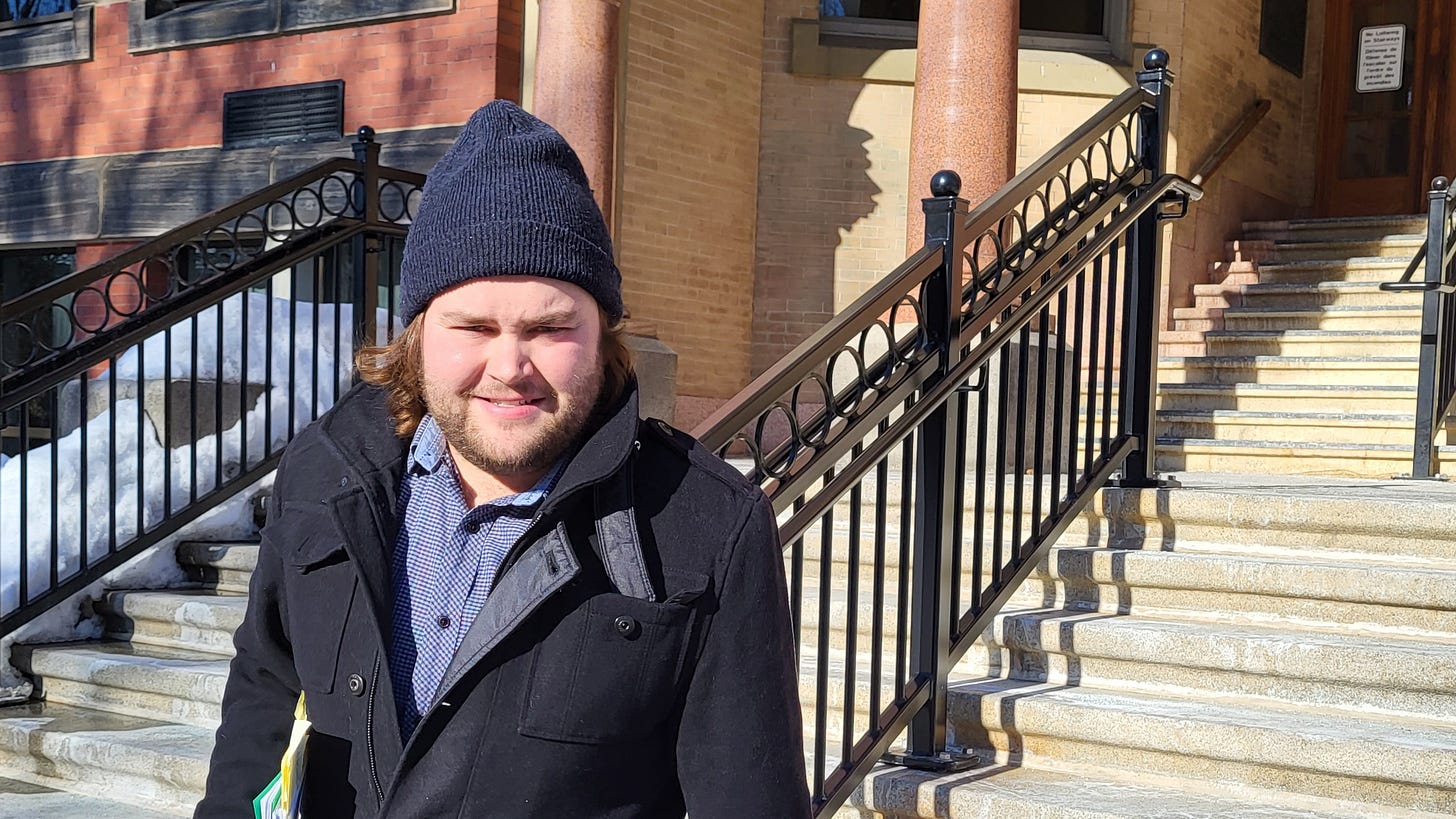Anti-mandate protester butts heads with chief justice
Sean Patrick Kenney, 26, of New Maryland, wants retrial before a jury on a masking charge, but Court of Appeal schools him on the law
A vocal opponent to pandemic restrictions asked New Brunswick’s top court to grant him a new trial for a masking offence so he can challenge its constitutionality.
But the chief justice told him that ship had sailed, noting he needed to broach that issue at the original trial.
Sean Patrick Kenney, 26, of Cortland Street in New Maryland, represented himself Tuesday before a three-judge panel of the New Brunswick Court of Appeal.
He was seeking a new trial on an Emergency Measures Act (EMA) charge for refusing to wear a mask at Wal-Mart on Fredericton’s south side in April 2021.

Kenney was convicted after trial on that charge by provincial court Judge Julian Dickson. Court of King’s Bench Justice Terrencer Morrison dismissed his summary court appeal, so Kenney sought to challenge that decision at the Court of Appeal.
Appeal court Chief Justice Marc Richard told Kenney at the outset of Tuesday’s proceeding his arguments should focus on any possible error in law that Morrison could have made during the summary-court appeal.
Richard said the Court of Appeal could only rule on questions of law alone, and that it wouldn’t deal with arguments over Dickson’s original trial decision.
But Kenney countered that the appeal court should consider Dickson’s decision.
“The main thing that we’re asking for is a retrial at a higher level,” Kenney said.
He has repeatedly asked for his charges to be decided by a jury.
“You can’t get a retrial at a higher level,” Richard said, noting that the EMA ticket was a provincial offence, which by definition can only be tried at the provincial court level, which doesn’t allow for juries.
“There’s no flexibility on that.”
Taking issue with court access during pandemic
Kenney also argued his case was about proper access to the courts during pandemic restrictions, and he asked Richard if he was the same person who had signed a court order limiting the public’s presence in courtrooms earlier in the pandemic.
The chief justice confirmed he had signed such orders, but he noted it was irrelevant because the case in question was for failing to mask at Wal-Mart, not non-attendance in court.
“But I was not able to come in and properly defend my case,” Kenney said.
Richard noted the one time Kenney was barred from court during the Wal-Mart case over his refusal to wear a mask was at its conclusion, when Dickson was rendering his decision.
Kenney was present for the trial itself and even testified, he noted.
The appellant then pivoted to the notion that he had a medical exemption from wearing a mask, arguing the province’s chief medical officer of public health had, at one point, said people didn’t need to go to their doctors to get written exemptions.
“I had a medical exemption at Wal-Mart,” Kenney said.
“No, you didn’t. The judge didn’t believe you,” Richard said, noting that was a finding of fact Dickson made, and the Supreme Court of Canada has ruled higher courts can’t interfere with such findings of fact by trial judges.
Kenney pointed out none of the three appeal judges were wearing masks Tuesday, while COVID-19 is still a going concern in society. He argued if it’s not dangerous now, it shouldn’t have been deemed dangerous enough to require masking in 2021.
Justice Kathleen Quigg pointed out there’s no emergency order in place now.
Furthermore, Richard said it’s not about the danger, but about the law. As an example, he noted speeding down an abandoned, straight highway at night is a lot less dangerous than speeding down busy city streets during the day, but both are illegal.
Constitutional argument comes too late
Kenney said the EMA order took people’s rights away.
“So does the Motor Vehicle Act,” Richard said, but unless a law is shown to be unconstitutional, it has to be treated as valid.
The only issue to be determined was whether Kenney broke the law by violating the emergency order, Richard said, noting the appeal court needn’t consider whether the order violated people’s rights.
“Nobody challenged the constitutionality of that,” the chief justice said.
“Well, I’d like to challenge that here,” Kenney said.
It doesn’t work that way, Richard said, noting constitutionality is something that has to be broached at the original trial, and it wasn’t in this case.
“There was a time and a place for it,” he said.
Kenney said the EMA is “a complete and utter fraud,” and its enforcement was an abuse of power.
He said everyone involved in its enforcement - including deputy sheriffs, prosecutors and even judges at all levels of court - were willingly participating in that fraud.
That’s when things got tense in the province’s top court, as Richard asked Kenney if he was suggesting the judges on the appeal panel were a part of the corruption he was alleging.
The chief justice said if that’s what the appellant was saying, the court would have to explain to him what contempt of court is.
Kenney walked his comments back a bit, alleging judges in provincial court and the Court of King’s Bench were culpable.
“There is fraud, 100 per cent,” he said.
Richard told Patrick McGuinty, counsel for the Office of the Attorney General, the court had read his written submissions and didn’t need to hear oral arguments from him on Kenney’s appeal.
He said the court would render its written decision at a later date.
Don MacPherson can be contacted at ftonindependent@gmail.com.





Thank you for keeping us informed on important issues. I look forward to everything from you.
Like the old saying goes, " Only a fool would represent himself at trial